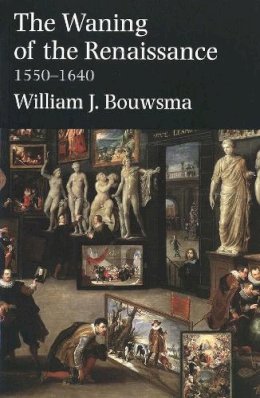
Stock image for illustration purposes only - book cover, edition or condition may vary.
The Waning of the Renaissance, 1550-1640
William J. Bouwsma
€ 47.29
FREE Delivery in Ireland
Description for The Waning of the Renaissance, 1550-1640
Paperback. Historian William J. Bouwsma here examines the conventional view of the European Renaissance as the root and foundation of modern culture, arguing instead that while it had a beginning and a climax, the Renaissance also had an ending. Series: Yale Intellectual History of the West. Num Pages: 318 pages, black & white illustrations. BIC Classification: 1D; 3JB; 3JD; HBJD; HBLH; JFCX. Category: (P) Professional & Vocational; (U) Tertiary Education (US: College). Dimension: 234 x 156 x 18. Weight in Grams: 491.
Historians have conventionally viewed intellectual and artistic achievement as a seamless progression in a single direction, with the Renaissance, as identified by Jacob Burckhardt, as the root and foundation of modern culture. But in this brilliant new analysis William Bouwsma rethinks the accepted view, arguing that while the Renaissance had a beginning and, unquestionably, a climax, it also had an ending.
Examining the careers of some of the greatest figures of the age—Montaigne, Galileo, Jonson, Descartes, Hooker, Shakespeare, and Cervantes among many others—Bouwsma perceives in their work a growing sense of doubt and anxiety about the modern world. He considers first those features of modern European culture generally associated with the traditional Renaissance, features which reached their climax in the late sixteenth and early seventeenth centuries. But even as the movements of the Renaissance gathered strength, simultaneous impulses operated in a contrary direction. Bouwsma identifies a growing concern with personal identity, shifts in the interests of major thinkers, a decline in confidence about the future, and a heightening of anxiety.
Exploring the fluctuating and sometimes contradictory atmosphere in which Renaissance artists and thinkers operated, Bouwsma shows how the very liberation from old boundaries and modes of expression that characterized the Renaissance became itself increasingly stifling and destructive. By drawing attention to the waning of the Renaissance culture of freedom and creativity, Bouwsma offers a wholly new and intriguing interpretation of the place of the European Renaissance in modern culture.
Examining the careers of some of the greatest figures of the age—Montaigne, Galileo, Jonson, Descartes, Hooker, Shakespeare, and Cervantes among many others—Bouwsma perceives in their work a growing sense of doubt and anxiety about the modern world. He considers first those features of modern European culture generally associated with the traditional Renaissance, features which reached their climax in the late sixteenth and early seventeenth centuries. But even as the movements of the Renaissance gathered strength, simultaneous impulses operated in a contrary direction. Bouwsma identifies a growing concern with personal identity, shifts in the interests of major thinkers, a decline in confidence about the future, and a heightening of anxiety.
Exploring the fluctuating and sometimes contradictory atmosphere in which Renaissance artists and thinkers operated, Bouwsma shows how the very liberation from old boundaries and modes of expression that characterized the Renaissance became itself increasingly stifling and destructive. By drawing attention to the waning of the Renaissance culture of freedom and creativity, Bouwsma offers a wholly new and intriguing interpretation of the place of the European Renaissance in modern culture.
Product Details
Format
Paperback
Publication date
2002
Publisher
Yale University Press United States
Number of pages
304
Condition
New
Series
Yale Intellectual History of the West
Number of Pages
304
Place of Publication
, United States
ISBN
9780300097177
SKU
V9780300097177
Shipping Time
Usually ships in 7 to 11 working days
Ref
99-1
Reviews for The Waning of the Renaissance, 1550-1640
